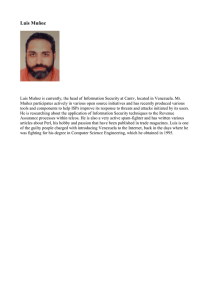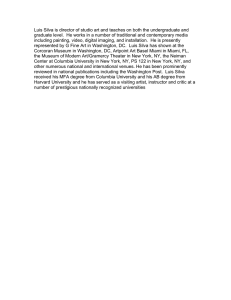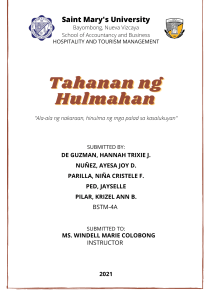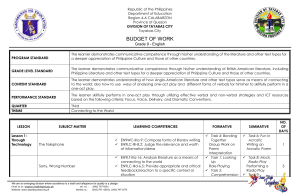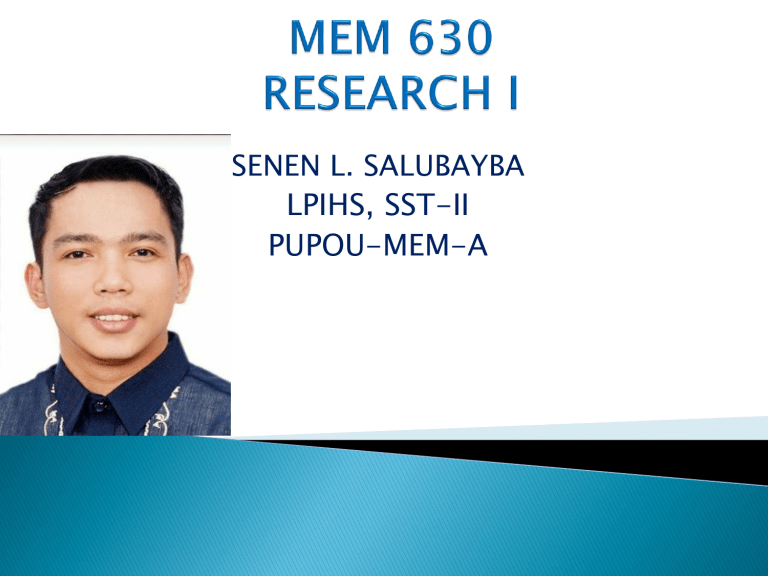
SENEN L. SALUBAYBA LPIHS, SST-II PUPOU-MEM-A Home Visitation Towards Reconnecting the School with the SARDOS A teacher has a very diverse role within the educational environment. In the Classroom, he/she must be an instructor, critic, disciplinarian, motivator, role model and adviser. However, a teacher’s job can expand to include other roles outside the classroom. Many teachers assume roles outside of the classroom to facilitate the development of a good rapport or for other reasons. Roles for a teacher outside the instructional environment include being a coach, tutor, and counselor. These roles are also portrayed during home visitation. Home visit is a way to bridge the gap between school and home for students, families, and teachers. As several researchers have shown the importance of parents supporting their children’s learning at home, a home visit is one way to deepen the partnership between teachers and parents and increase the student’s chances for success (KILGORE, 2014). Likewise, home visit is being conducted by teachers to support families to provide an environment that promotes healthy growth and development of children. This program may target families and caregivers who are at a particular disadvantage when it comes to establishing and maintaining such an environment. It may also focus on families in which the child is more vulnerable than the typical child because of health or developmental concerns. It is also a service-delivery model that can be used to develop appropriate interventions to target participants (GAYLER & SPIKER, 2012). Luis Palad Integrated High School, as progressive and prolific institutions, continue to serve the entire community of Tayabas City through its sustained adherence to the noble mission of protecting and promoting the right of every Filipino to equality, equitable, culture-based, and complete basic education where; students learn in a child-friendly, gendersensitive, safe, and motivating environment, teachers facilitate learning and constantly nurture every learner; administrators and staff as stewards of the institution, ensure an enabling and supportive environment for effective learning to happen; and family, community, and other stakeholders are actively engage and share responsibility for developing lifelong learners (www.depedtayabascity.ph, 2014) In this light, the researcher, being a secondary teacher in the Division of Tayabas City was prompted to conduct this research for the reason that he is also conducting the home visits and he wants to be more confident in the logistics of the said program by redesigning the school home visit program. This would lead to a more systematic and effective home visits in the entire Division of Tayabas. Focusing on the success indicators through evaluation of home visiting intervention is interesting for two reasons. First from applied perspective, questions have been raised about the effectiveness of such interventions. While randomized controlled trials demonstrating effectiveness of individual programs have resulted in increased government funding, questions remain about which programs, work and the reasons for success or failure (OLDS & KORFMACHER, 1997). Second, well-designed intervention may be viewed as experiments that test family theories. For example, home visiting programs that succeed through involving parents in a supportive community confirm the relevance of System Theory Model. Thus, the study is anchored on the logic model wherein the influence of system theory on this model approach to evaluation can be seen in its careful attention to the relationships between program components and the components’ relationship to the program’s context (FECHTLING, 2007). Though often used during program planning instead of solely as an evaluation approach, the logical model structure strongly supports a rational evaluation plan. The logic model, similar to the evaluation model is already discussed, can be strongly linear in its approach to educational planning and evaluation. In its least complicated form, it may over simplify the program evaluation process and thus not yield what educators need. With careful attention to building in feedback loops and to the possibility of circular interactions between program elements, however, the logic model can offer educators an evaluation structure that incorporates system theory applications into thinking about educational programs (FRYE and HEMMES, 2012). INPUTS ACTIVITIES OUTPUTS OUTCOMES Luis Palad Integrated High School – Division of Tayabas Home Visit Program Objectives Resource/Funding support Teacher Involvement Conduct of Home Visit Program Strategies & Treatment employed Success Indicators Family Involvement Student’s Engagement Student’s Achievement Redesigning of relevant Home Visit Program The figure shows the direction of the study wherein the home visit program of Luis Palad Integrated High School were analyzed in terms of its description as to objectives, resource and faculty; reasons for conducting home visit program as well as the strategies and treatments employed. These would determine the success indicators of the said program in terms of family involvement, student’s engagement and student’s achievement and eventually the redesigning of relevant home visit program. The purpose of the study was to evaluate the home visit program of Luis Palad Integrated High School in the Division of Tayabas City by determining the success factors.This would contribute to the development of a relevant intervention program for teacher’s home visit. Specifically, it sought to achieve the following objectives; 1. Describe the demographic profile of teacherrespondents in terms of: 1.1 age 1.2 gender 1.3 educational attainment 1.4 rank/position 1.5 length of service 2. Investigate the teacher’s home visit program in LPIHS in terms of: 2.1 objectives 2.2 resource/funding 2.3 teacher involvement 3. Analyze the strategies and treatments employed during the home visit program 4. Assess the success indicators of the home visit program; and 5. Design a procedural guide for home visit program Home visit Program of Luis Palad Integrated High School in terms of Objectives 5-Strongly Agree, 4-Agree, 3-Moderately Agree, 2-Disagree, 1- Strongly Disagree A. Objectives 1. The objectives are aligned with the schools’ vision-mission statement 2. The objectives of teacher’s visit program aim to promote compulsary education for students in public schools. 3. The objectives are timely and relevant to the needs of the students. 4. The objectives provide support services for their academic achievement. 5. The objectives serve as a guide in the actual execution of the home visit program. 6. The objectives are clearly stated to all stake holders. 7. The objectives are attainable to address the needs of the home visit clienteles. 8. The objectives are measurable that will be necessary in the evaluation of the home visit program. 9. The objectives are realistic in terms of the available resources. 10. The objectives give direction and organization to the conduct of school home visit. 5 4 3 2 1 Home visit Program of Luis Palad Integrated High School in terms of Resource/Funding Support 5-Strongly Agree, 4-Agree, 3-Moderately Agree, 2-Disagree, 1- Strongly Disagree A. Resource/Funding Support 1. The school has adequate resources to support its home visit program. 2. Materials for the home visit are sufficiently provided by the school. 3. The outside community of the school provides the additional funding support fort\ the home visit program. 4. Transportation expenses are shouldered by the school. 5. Communication expenses are shouldered by the school. 6. Parent-Teacher’s Association allocates budget for the home visit program of the school. 7. Food and refreshments are provided in the home visit program of the school. 8. Non-government organizations support the home visit program of the school. 9. Additional Allowances are given for the teachers conducting home visit program. 10. The local government unit subsidizes the needs of the home visit program of the school. 5 4 3 2 1 Home visit Program of Luis Palad Integrated High School in terms of Teacher Involvement 5-Strongly Agree, 4-Agree, 3-Moderately Agree, 2-Disagree, 1- Strongly Disagree A. Teacher Involvement 1. Teachers always communicate with the parents of the sudents. 2. Teachers assess the conduct of their home visit program. 3. Teachers conducting home visits are spending for the unforseen expenses of the program. 4. Teachers adhere to the vision and mission statement of the school. 5. Teachers keep and update their student clienteles in the home visit program. 6. Teachers carefully plan and organize the process of their home visits. 7. Teachers spend enough time in conducting home visits. 8. Teachers enhance their knowledge on the conduct of home visit. 9. Teachers utilizes strategies and techniques adhering to the constructivist approach for the 21st century learners. 10. Teacher attend seminars to update themselves in the conduct of home visit program. 5 4 3 2 1 THANK YOU FOR LISTENING!!!
